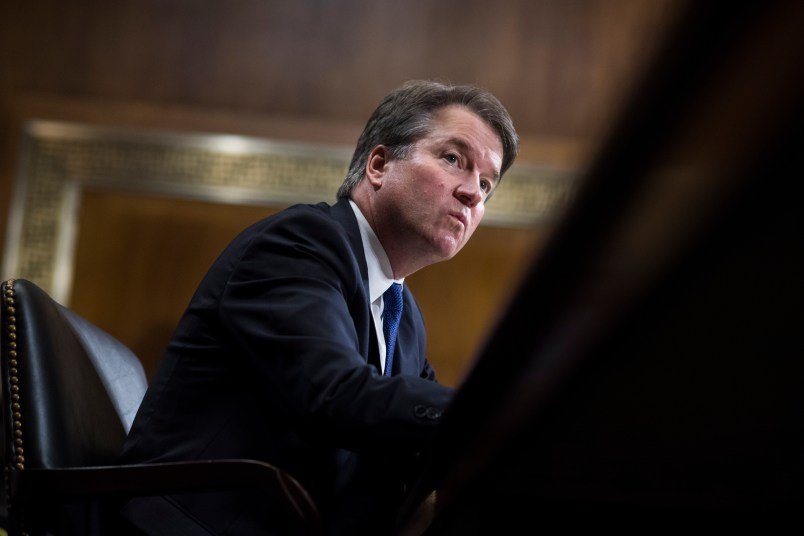The Senate confirmed Judge Brett Kavanaugh to the Supreme Court Saturday, helping conservatives achieve a long-held goal of shifting the high court farther to the right.
The 50-48 vote — which was more or less a formality, given that the key swing senators announced their votes on Friday — was the denouement of a bitter and dramatic confirmation fight. In the final stretch, Kavanaugh faced sexual misconduct allegations, as well questions about his temperament, honesty and ability to remain independent.
His at times combative defense of himself rallied Republicans around him. Sen. Lisa Murkowski (AK) was the only GOP senator who opposed his confirmation, although she voted present Saturday to offset the absence of Sen. Steve Daines (R-MT), who was attending is daughter’s wedding. Sen. Joe Manchin (D) was the only Democrat who voted to support him, a decision he announced only after it was clear he would not be the deciding vote.
As senators awaited the conclusion of the vote, Sen. Claire McCaskill (D-MO) could be seen hugging Sen. Susan Collins (R-ME) as Collins left the chamber. Collins was the key Republican vote for Kavanaugh that secured the confirmation. Meanwhile, Manchin was getting a lot of pats on the back from Republican Sens. Lindsey Graham (R-SC), John Barrasso (R-WY), Tom Cotton (R-AK) and Pat Roberts (R-KS).
Vice President Mike Pence presided over the final vote. The vote was periodically interrupted by protesters loudly erupting in the Senate gallery.
“This is stain on American history,” one protestor shouted after Pence gaveled the final vote.
The 53-year-old Kavanaugh replaces the retired Justice Anthony Kennedy and could serve on the court for decades. While mostly voting with the conservative bloc, Kennedy was a crucial protector of abortion rights and gay rights, and was a swing vote on affirmative action, some criminal justice issues, and the separation of church and state.
The addition of Kavanaugh stands to reshape drastically the jurisprudence of many, if not all, of those issues.
Before his appointment to the federal bench by President George W. Bush, Kavanaugh was a GOP legal operative who was deeply involved in some of the most controversial and partisan issues of the 1990s and early aughts. He worked for Ken Starr’s investigation, served on Bush’s legal team during the 2000 recount fight, and held key roles in the Bush White House.
On the influential federal appeals court in D.C., Kavanaugh wrote opinions that sought to cripple the Consumer Financial Protection Bureau, water down Obamacare’s contraceptive mandate and impede an undocumented immigrant minor’s efforts to obtain an abortion.
Democrats also raised concerns about his views on executive power, and whether he was selected by President Trump because he would be a sure-fire vote to protect Trump from the various investigations and lawsuits surrounding his presidency.
His confirmation is a major victory for Trump, who campaigned on appointing deeply conservative judges who would be anti-abortion and pro-gun rights. Kavanaugh is the second Trump pick to make it to the Supreme Court, after Justice Neil Gorsuch was confirmed in April 2017 for a vacancy help open for for more than a year by Senate Republicans. Unlike Gorsuch — who replaced the far-right Justice Antonin Scalia — Kavanaugh is taking the place of a justice who was a less reliable vote for Republicans and could prove to be more dependably conservative than his predecessor.
Saturday’s vote was also a milestone moment for the conservative legal movement, led by the Heritage Foundation, the Federalist Society and its dark money campaign arm, the Judicial Crisis Network. Those groups have been deeply involved in Trump’s judicial selection process and helped shaped the various lists that Trump released touting his potential Supreme Court picks. Kavanaugh’s name first appeared on a November 2017 iteration of the list, which came out weeks after the judge made a speech at a right-leaning think tank that was interpreted by some as signaling a willingness to roll back abortion rights.
These same conservative activists circled the wagons when allegations of sexual assault against Kavanaugh first came out, by pouring more than $1 million in television campaigns defending the judge and floating outlandish conspiracy theories that would clear Kavanaugh’s name.
Chief Justice John Roberts becoming the median justice, ideologically, on the court will encourage conservative legal advocates to pursue an even more aggressive judicial strategy that has already allowed them to hinder voting rights, undercut women’s access to reproductive services, curtail LGBT equality and boost the interests of corporate America.
As Kavanaugh joins the court, likely early next week, there are already major cases coming up the pipeline on abortion, affirmative action and the Affordable Care Act, where his vote could prove to be crucial for Republicans. A number of Trump administration’s agenda-items will likely end up in front of the Supreme Court for review, including the President’s immigration policies, the addition of a citizenship question to the Census and his rollback of environmental protections.
But beyond the Trump-era, Kavanaugh will likely serve as a crucial vote for conservatives if and when Democrats take back control of Washington. Kavanaugh has been particularly skeptical of the deference given to federal agencies in enacting regulations, a view that could hamstring progressive governance for decades to come.







They are complete fools.
Let the investigation begin!
Did TMP’s headline say that they’ve added a “jerk” to the court?
May he be hounded every day he’s out in public and may his days be completely miserable
That’s all folks.
A permanent message that both sides are not the same.